Newsletter


Our Newsletter
Connections
Oct
30
Full Continuum of Care at the Jewish Home
From its humble beginnings in 1912, the Los Angeles Jewish Home has grown to become one of the largest providers of senior healthcare services in Los Angeles. Through our innovative Connections to Care® program, each year thousands of seniors benefit from the Home's community-based and in-residence programs. By calling our hotline at (855) 227-3745, you can connect to expert professional Jewish Home staff to access our full continuum of services.In-Home and Community Health Services PACE (Program of All-inclusive Care for the Elderly) enables frail seniors with multiple health conditions to live safely at home. Among the program's many services are adult day healthcare; primary and specialty medical care; vision and dental care; medications; physical, occupational and speech therapy; transportation; acute care; home health care and caregiving. The program serves participants age 55 and over who live in the Jewish Home's service area.Jewish Home Care Services offers a full spectrum of restorative services in the individual's home. Clients are referred by a physician's written order, and treatments are provided according to a plan of care jointly developed by the referring physician, the person receiving care, the caregiver, and others. Home health care services are available to adults over 19 years of age in the Greater Los Angeles Area.Jewish Home Center for Palliative Medicine provides comprehensive pain and symptom management for adults with serious, chronic, and/or life-limiting illness. Our team of professionals addresses the medical, psychological, social, and spiritual needs of our patients.The Geriatric Community Clinic is located on the Jewish Home's Eisenberg Village campus in Reseda. The clinic provides primary and specialty medical care to seniors.Skirball Hospice provides compassionate end-of-life care for adults with a life-limiting illness in the Greater Los Angeles area. Skirball Hospice treats patients in their home or care facility. Hospice care includes pain management, medical equipment, supplies, and personal care. Our staff members work as an integrated team, including nurses, chaplains, social workers, registered dieticians, and certified home health aides.Short-Term Care at the Jewish HomeThe Ida Kayne Transitional Care Unit (TCU) is designed to help seniors successfully recover from an illness, injury, medical procedure, or acute hospital stay. The TCU provides short-term rehabilitative and skilled nursing care. Patients in the TCU receive treatment from physicians and geriatric specialists in physical, occupational, and speech therapy. The average length of stay ranges between two to six weeks. When possible, TCU seniors discharged home may transition with short-term skilled nursing and/or rehabilitative therapies through Jewish Home Care Services.Auerbach Geriatric Psychiatry Unit (AGPU) is certified to treat both voluntary and involuntary admissions, AGPU provides short-term geriatric psychiatric care to individuals over the age of 55 who are experiencing stressful mental or emotional challenges that require intensive, short-term acute hospital psychiatric care. Most commonly treated diagnoses are depression, bipolar disorders, post-traumatic stress disease (PTSD), schizophrenia, delirium, and Alzheimer's or other age-related dementia with behavioral disturbance. The average length of stay is 10-14 days. The primary care physician is kept informed during the patient's stay, and follow-up appointments are made with the patient's physician as a part of the discharge plan.Long-Term Care at the Jewish HomeIndependent Senior Housing is available at Fountainview at Eisenberg Village and Fountainview at Gonda Westside. Both are licensed as a Continuing Care Retirement Community (CCRC) and are designed for active independent senior living. Fountainview residents have easy access to assisted living services in their unit (as needed), as well as priority access to the Home's skilled nursing facilities.Residential Care is currently available at Eisenberg Village in Reseda for seniors over 65 years of age, independently mobile, and mentally alert. Residential care includes meals, medication management, social services, chaplaincy, fitness and recreational activities, transportation, and many educational programs.The Goldenberg•Ziman Special Care Center (G•Z) is among the most advanced of its kind in the world. The Center is designed to provide exceptional skilled nursing care for patients with Alzheimer's disease and age-related dementia.Skilled Nursing Care is offered at our Grancell and Eisenberg Village campuses. Long-term skilled nursing services play a critical role in stabilizing and improving seniors' health and enhancing their quality of life and sense of well-being.To learn more about Connections to Care® and the programs and services of the Jewish Home, please call (855) 227-3745 or visit our website at www.lajh.org.
Oct
17
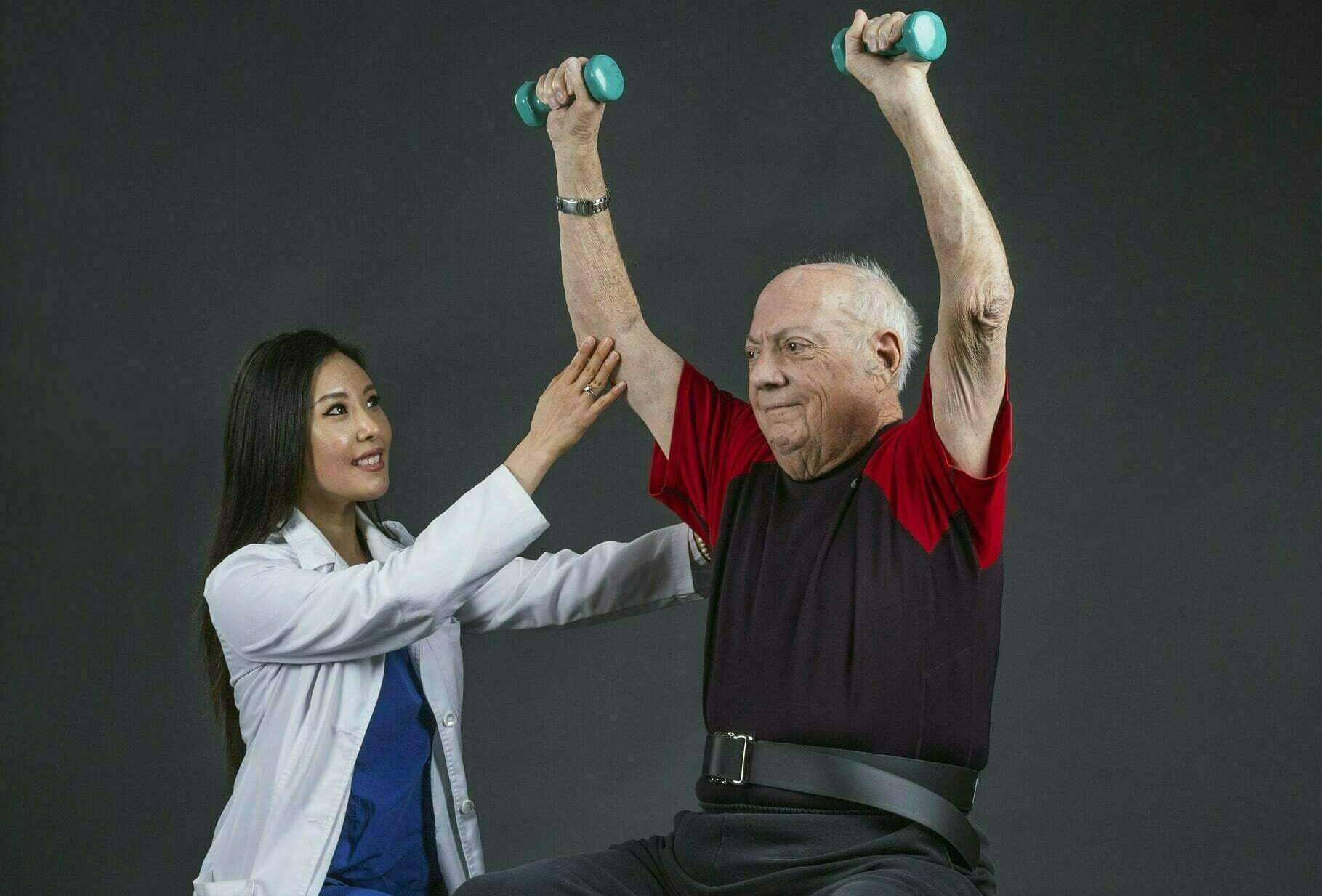
Short-Term Rehab
As we recover from an illness, injury, medical procedure or acute hospital stay, short-term rehab can be a crucial ally in putting us on the road to wellness. For seniors, this is especially true: The support short-term rehab provides is often a key factor in helping them regain self-sufficiency and return to their own homes or communities as quickly as possible.
The Advantages of Short-term Rehab.
Seniors working to get back on their feet can reap enormous benefits from short-term rehab. A surgery, illness or medical episode can leave seniors lacking the vital strength they need to care for themselves, and working with medical professionals who specialize in short-term rehab can help them rebuild that strength, restore their confidence, and prepare to reclaim their former independence.
How Short-term Rehab Helps
Short-term rehab serves as a bridge for seniors – facilitating their transition between hospital and home. It is geared to treat a broad range of conditions including:
Joint replacement rehabilitationOrthopedic post-hospitalization careStroke and neurological rehabilitationPost-medical and post-surgical recoveryAdaptive equipment instruction and conditioning
In short-term rehab, seniors focus on regaining critical function and recovering their physical, sensory and mental capabilities. They receive a wide variety of therapies and nursing services as they heal and make progress toward their ultimate goal: getting home as quickly as possible.
A number of things to keep in mind while evaluating potential options for short-term rehab are:
Defining short-term rehabKnowing what to look for in a short-term rehab facilityHoming in on short-term rehab that specializes in serving the elderlyFinding a short-term rehab that accepts Medicare
Short-term Rehab at the Jewish Home
When it comes to effective short-term rehab, the Jewish Home offers unparalleled expertise. Seniors in the Home’s Transitional Care Unit (TCU) are cared for by physicians and geriatric specialists in physical, occupational, and speech therapy. They also enjoy full access to all of the Home’s cutting-edge clinical and support services.
The Jewish Home short-term rehab team integrates state-of-the-art medical care and prescribed therapies with personal coaching, counseling, and nutritional guidance. Seniors spend an average of two to six weeks in the TCU, though the unit accommodates stays of up to 90 days.
For more information about short-term rehabilitative care and physical therapy at the Jewish Home, please contact our Connections to Care® hotline at (855) 227-3745.
Oct
11
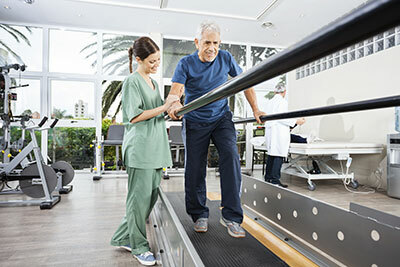
October is National Physical Therapy Month!
National Physical Therapy Month is commemorated each October by the American Physical Therapy Association. The goal of this month-long celebration is to raise awareness of the important role physical therapists and physical therapy assistants play in helping people decrease pain, improve mobility, and engage in healthy lifestyles.
A physical therapist is a trained and licensed medical professional specializing in diagnosing physical abnormalities, maintaining and restoring mobility, and promoting physical activity and function.
Licensed physical therapists work in a variety of healthcare settings including outpatient offices, private practices, hospitals, rehab centers, nursing homes, home health, sports and fitness settings, schools, hospices, occupational settings, government agencies, research centers…and the Los Angeles Jewish Home.
Physical therapists treat a wide range of medical conditions: sports-related injuries, carpal tunnel syndrome, back pain, neurological disorders, and much more.
Physical therapy is particularly beneficial for seniors, especially after they've had a stroke, knee or hip replacement or other surgery, or are recovering from a fall.
Are you in pain? Do you need a licensed physical therapist? Ask your doctor to refer you to the Los Angeles Jewish Home. Noah S. Marco, M.D., Jewish Home Chief Medical Officer, says, "We offer a wide range of physical therapy programs, including therapeutic exercise and fitness training, massage, and thermal therapy. All in a comforting, welcoming environment. We'll help get you back on your feet."
To learn more about physical therapy at the Jewish Home, please call our Connections to Care® hotline at (855) 227-3745.
Oct
11

Long-Term Care: What’s Your Plan?
October is Long-Term Care Planning Month. If you're a senior and haven't started planning, it's time to begin! Plan now while you have time to choose how and where you receive care, if needed, in the future. That's something your family will also appreciate.
What exactly is long-term care?
Long-term care refers to services and support you may need to meet your personal care needs. Most long-term care is not medical care, but rather assistance with the basic personal tasks of everyday life, sometimes called Activities of Daily Living (ADLs). These include bathing, dressing, toileting, transferring (walking), eating, and maintaining continence.
Who needs long-term care?
70% of people age 65+ can expect to use some form of long-term care during their lives. Women are more likely to need long-term care than men because they outlive men by an average of five years.
Who provides long-term care?
Many people receive long-term care from family or friends in the comfort of their home. Also, services are offered by public and private organizations, such as home care agencies: home-delivered meals, supervised adult day programs, plus the assistance of visiting nurses, therapists, or home care aides.
Some people decide to move to a long-term care facility, including:
Continuing care retirement communities, which typically offer services such as housekeeping and diningAssisted living, for people who need help with personal care like bathing or getting dressedAround-the-clock care at a nursing home for people with greater health-related needsWho pays for long-term care?
Long-term care can be costly, and most health insurance plans, Medicare, and even Medicaid don't cover many fees.
Planning on planning long-term care?
Make the Los Angeles Jewish Home part of your long-term care plan. Our senior-focused Connections to Care® program can connect you to the type of long-term care you may need: residential care, independent living, assisted living, Alzheimer's disease and dementia care, and skilled nursing.
Even though October is Long-Term Care Planning Month, in reality, every month should be. Because the best time to plan for long-term care is before you need it. The best time is now!
To learn more about long-term care at the Jewish Home, click here or call our Connections to Care® hotline at (855) 227-3745.
Oct
2
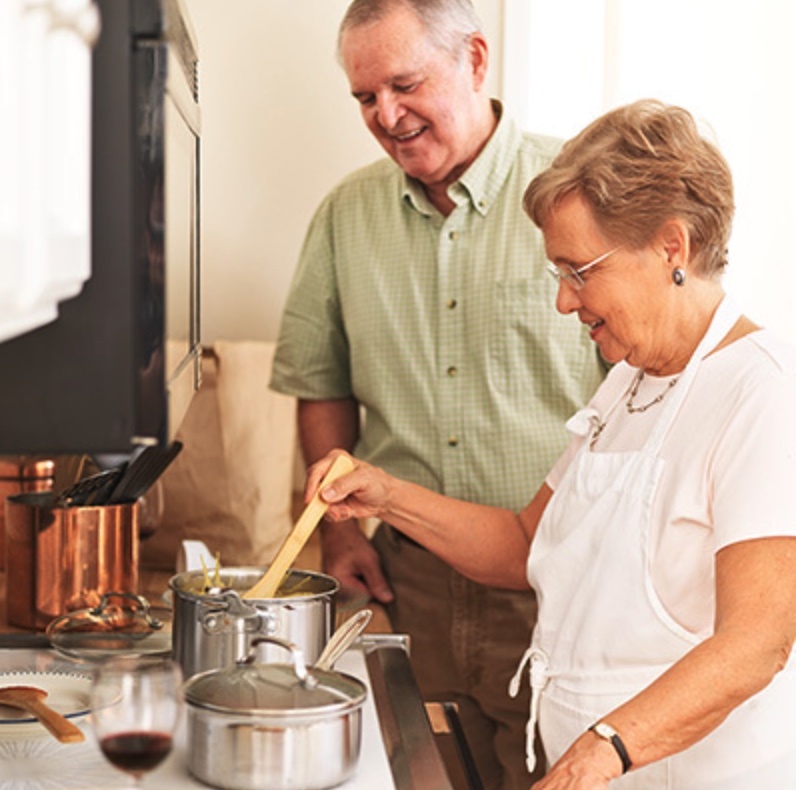
The 4 Rules of Food Safety
Healthy eating should be a priority throughout our lives. As we age, it becomes an important factor in staying active and independent. Planning our meals with a focus on getting the right nutrients and maintaining a healthy weight will give our immune system a boost. Plan your meals to maximize nutrients by including lean protein, fruits and vegetables, whole grains, and low-fat dairy.
Seniors may become more susceptible to foodborne illnesses as their immune system weakens and stomach acid decreases, leaving bodies unable to fully fight the bacteria or virus causing the illness. For older adults age 65+, the results can be dangerous, even fatal.
If you have ever experienced a foodborne illness, commonly known as food poisoning, you know it is extremely unpleasant, to say the least. Nausea, vomiting, diarrhea, even body aches, fever and headaches combine to create quite the memorable experience. This takes a toll on the human body at any age, often resulting in dehydration and an overall feeling of weakness.
The good news is we can take action to prevent contracting foodborne illnesses by following 4 basic food safety rules:
CLEAN. Washing your hands frequently with soap and warm water throughout the food preparation process. Be sure to wash them again if you sneeze or cough. Also keep all surfaces clean, including counters, cutting boards, and tables as well as utensils.SEPARATE. Be sure to keep raw and cooked foods separate. While in the refrigerator, raw fruits, vegetables and ready-to-eat foods should be kept away from raw meats. During prep, clean surfaces and wash your hands after handling raw foods.COOK. Always cook foods to their proper temperatures. A food thermometercan ensure your food is cooked thoroughly all the way through. When preparing food in a microwave, make sure there aren't any cold spots that may contain bacteria.CHILL. Refrigerate foods promptly. Follow the 2 Hour Rule: Don't allow perishable foods to sit on the counter for more than 2 hours. Do not thaw meat on the counter! Toss any food not stored at the appropriate temperature for more than 2 hours.
There are also some foods that seniors should avoid or consider carefully before eating:
raw fishhot dogs and lunch meat unless heated to the appropriate temperatureraw or unpasteurized milk or fruit and vegetable juicesrefrigerated pates or smoked fishraw or lightly cooked eggsraw meat or poultryraw sprouts
So be careful about storing, preparing and eating food. By cleaning, separating, cooking, and chilling you can help prevent contracting a foodborne illness… at any age!
Sep
27
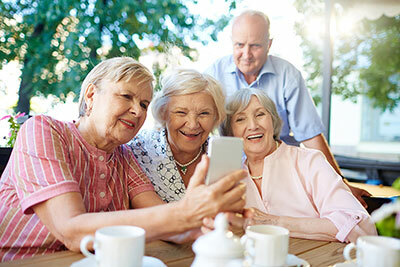
6 Reasons Why Seniors Should Make More of Social Media
You know the names: Facebook, Twitter, Instagram, YouTube. They’re seemingly everywhere and used by seemingly everyone.
In fact, according to the Pew Research Center, social media is becoming increasingly important for seniors. From 2013-2015, social media use by Americans 65 and older increased from 27% to 34%.
Younger senior citizens were more likely to use social media, with a Pew research study finding that 45% of those under 75 do so, versus 20% of those 75 and older.
Pew added social networking use is common among seniors with some college experience and an annual household income of at least $50,000.Studies also that show social media has become helpful in reducing isolation, loneliness, and other depressive symptoms.
Still, many seniors don’t use social media. And that’s unfortunate. Because social media offers many advantages.
Following are 6 reasons why you should make more of social media.
1. Get connectedSocial media gives you the opportunity to reconnect with old friends and make new ones. It’s a simple, entertaining way to learn about what your friends and family are doing—and let them know what you are doing. Sharing experiences is a great way to cement bonds with family and friends.
2. Be entertainedWhere else can you see a cat playing the piano, a man juggling a running chainsaw, and a concert pianist playing Bach—all for free? On your phone, on your computer, on your tablet. That’s entertainment!
3. Stay informedSocial media provides a powerful source of news and information. With a simple click, you can learn the latest in politics or the history of China—and so much more. Twitter is great for finding specific news sections you want to follow. Social media helps you get in the know.
4. Have your sayEverybody has an opinion. Social media provides a way to make your voice heard and engage in discussions with people who may (or may not) agree with you. Of course, the first rule in social media: be polite!
5. Check out dealsSocial media often runs ads targeted to your particular likes. It also frequently offers special deals to encourage you to purchase.
6. Watch for classes and eventsAre there any interesting classes or events being held nearby that might interest you? Social media will tell you where they are and when to go!
If you aren’t using social media, look into it. We think you’ll find it fun and informative.
Sep
18
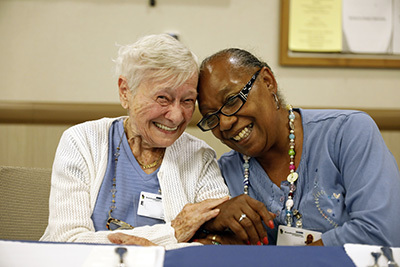
Brandman Centers for Senior Care-PACE Program Celebrates Inaugural Recognition of National PACE Mon
For the first time, the nation will celebrate and recognize the work of Programs of All-inclusive Care for the Elderly (PACE®) by establishing September as National PACE Month. PACE coordinates and provides all needed preventive, primary, acute, and long-term care services to older adults allowing them to live at home in their communities.
In recognition of the first National PACE Month and National Fall Prevention Awareness Day (September 22), the Jewish Home's Brandman Centers for Senior Care (BCSC) will celebrate with weeklong interactive fall prevention activities.; From September 18th through September 22nd, BCSC participants and staff will engage in fun and educative fall prevention workshops, activities, demos, and raffles.
The PACE model of care is a fully integrated, provider-based model that revolves around an interdisciplinary team of doctors, nurses, therapists, social workers, dietitians, drivers, and others who provide direct care and services to meet program participant needs. Despite serving a very frail nursing home-eligible senior population, only five percent of participants are living in nursing homes at any given time. More than 90 percent of PACE participants say they are very satisfied with PACE and would refer PACE to a close friend.
Nationally, 122 PACE programs in 31 states serve more than 40,000 PACE enrollees. Currently, PACE organizations in California serve more than 7,000 participants at 37 PACE Centers and Alternative Care Sites in 12 counties, including Alameda, Contra Costa, Fresno, Humboldt, Los Angeles, Orange, Riverside, Sacramento, San Bernardino, San Diego, San Francisco, and Santa Clara. CalPACE also provides tremendous fiscal benefits to the state of California in savings of up to $19 million per year.
For more information about Brandman Centers for Senior Care and PACE, please visit our website at www.brandmanseniorcare.org or call (818) 774-8444.
Sep
13

6 ways to Celebrate Healthy Aging Month!
September is Healthy Aging Month. Here are 6 things you can do to maintain your health as you age.
1. Keep movingWant to maintain a healthy body and mind? Exercise! Doctors recommend you get at least two and a half hours of exercise a week. Belong to a gym? Go! How about a daily brisk walk with a friend or family—or the family pet—which bolsters both your heart and lungs? Practice yoga or tai chi to improve balance and help prevent falls. Dance or do yardwork. The point is, keep moving.
2. Eat rightRemember what your parents told you: eat lots of fruits and veggies. Beans and other high-fiber foods are excellent for digestive and heart health. Feeling lethargic? Eat iron-rich foods such as spinach, beans, dried fruit, and meats. Want a snack? Stay away from processed sugar foods. Try nuts, dried fruit or trail mix. And remember, September is still harvest season, so check out your local farmers market.
3. Get your sleepLike they say, sleep is the best medicine. If you have trouble sleeping, talk to a sleep specialist. And take cat naps. Healthy Aging® magazine reports people who take naps are 37% less likely to die from heart disease.
4. Be socialThere's a link between having active social ties and living a longer life. Spend time with family. See old friends and make new ones. Surround yourself with positive people who make you happy. Continue your old hobbies and find new ones you can do with your friends or alone.
5. Keep learningIt's never too late to learn something new! Learn how to paint, sculpt, or play a musical instrument. Take history or computer classes. Study archeology or architecture. Learn whatever interests you. Remember, when you learn, you grow. 6. Spend wiselyCreate a budget. It's important to know where your money is going. And reducing your expenses can help reduce stress in your life. Plus, the money you save can go toward activities you enjoy: traveling, hobbies, sports…whatever makes you happy and keeps you moving.
Celebrate Healthy Aging Month this month… and every month!
Sep
7
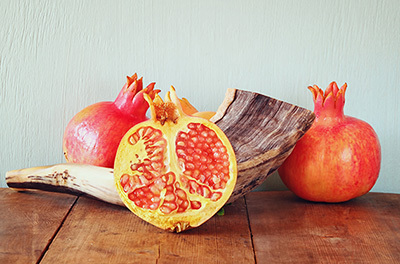
High Holy Days: A Time of Reflection and Promise
As we prepare for the High Holy Days, we reflect on the past and look toward the future. At the Los Angeles Jewish Home, we use the strong foundation of our history to build a bright future for our residents and their families.
This year has brought about big changes for the Home, particularly at our Grancell Village campus. In August, we completed demolition of approximately half of our Grancell campus. This is the first step to expanding our capacity to serve seniors in need of housing with assisted living, memory care, a community clinic and more.
While the change will ultimately result in an expansion of programs and services, it means the Home is unable to accommodate family members for High Holy Days services and meals at Grancell Village. We are very sorry for this inconvenience and the interruption in what is a long-standing tradition at the Home.
At Eisenberg Village, family members and guests are welcome to join their loved ones for services and meals throughout the High Holy Days. Services will be led by Rabbi Ron Goldberg and Cantor Joel Stern in the Ziman Family Synagogue. Please contact Allison Tepper at (818) 774-3386 or [email protected] for more information. Tickets must be purchased by September 13th.
At Grancell Village, residents and rehab patients will have the option of attending our mainstream services for Rosh Hashanah and Yom Kippur or a liturgical musical High Holy Days experience. All will be under the direction of Rabbi Karen Bender, director of spiritual life for the Jewish Home.
On behalf of the Los Angeles Jewish Home and our residents, we wish you a healthy and happy New Year!
L'Shana Tova!